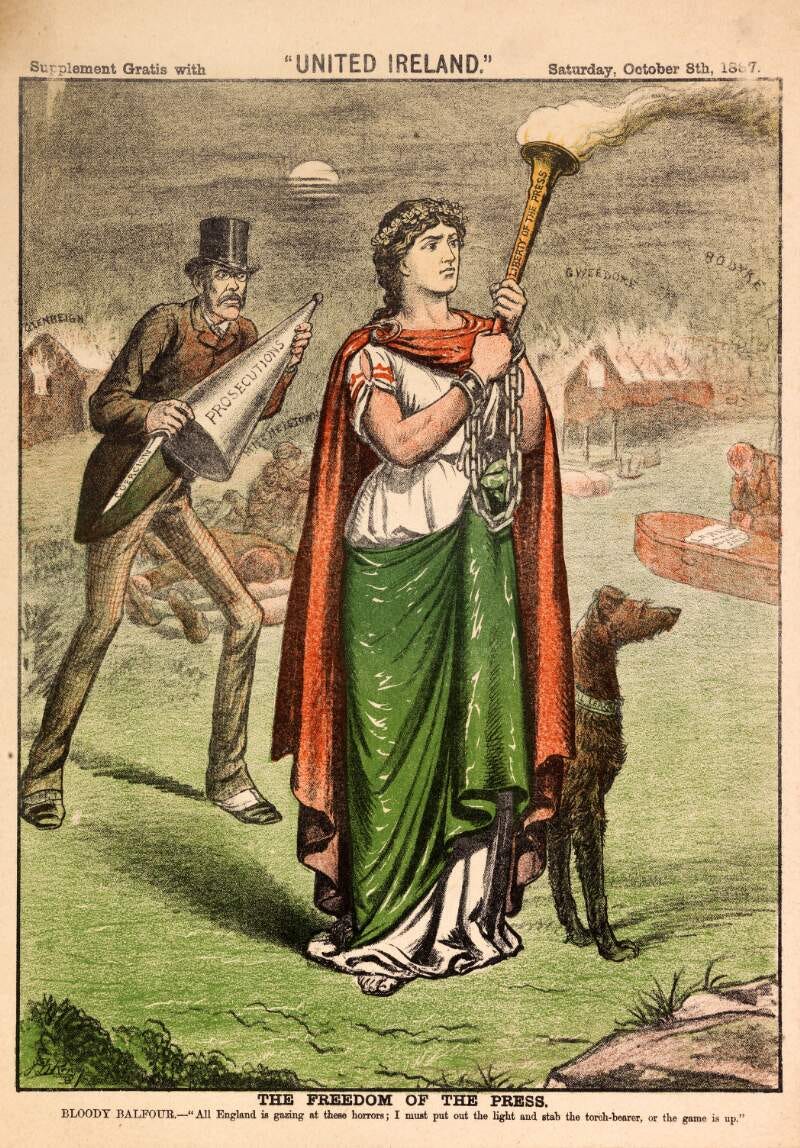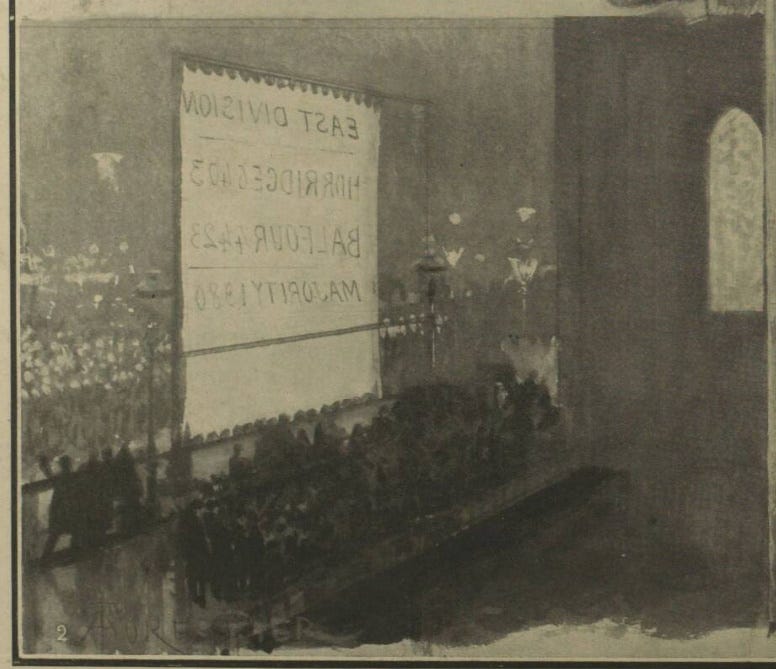One of the most extraordinary things about Manchester City’s history is how often it is entwined with the wider history of both Britain and the world.
In January 1906 a General Election took place that saw the Conservative Party suffer a landslide defeat, losing 246 seats. The result also ended a remarkable 16-year relationship between City and Arthur Balfour, who had stepped down as Prime Minister a month earlier.
Balfour had become the MP for the newly-created Manchester East consituency in 1885, after the Redistribution of Seats Act increased the number of eligible male voters from 2,338,809 to 4,094,674.
Switching to a new working-class constituency was a bold political gamble for the 37-year-old aristocrat, who had been nicknamed “Pretty Fanny” and “Miss Balfour” in parliament on account of his perceived effeminacy. But his surprise success in winning the seat soon brought rewards.
In 1887 his uncle, Prime Minister Robert Gascoyne-Cecil, appointed him Ireland Secretary (the furore over this perceived act of nepotism is widely believed to be the origin of the phrase "Bob's your uncle"). After brutally suppressing a rent strike in Ireland that year the Manchester East MP acquired another nickname: “Bloody Balfour”.
The Catholic vote had become crucial in the Manchester East constituency, leaving Balfour with a major image problem. So in 1890 the chairman of his election committee, brewer Stephen Chesters Thompson, set about repairing it.
It may be the first example of “sportswashing” in football.
Chesters Thompson, who was also president of Ardwick FC at the time, paid for the construction of a 11,000-capacity stadium at the Hyde Road site. That summer it hosted an athletics festival, where Balfour presented a 'handsome £25 silver cup' (worth £20,000 in today's money) to the winner of final event, the Four Mile Scratch Race.
In July 1891 Chesters Thompson organised a challenge shield competition of 48 schools, including four Catholic ones. After the event it was reported that he had 'generously offered to purchase a piece of land, if such could be obtained, for the use of the boys in Ardwick for recreative purposes, irrespective of creed’.
City also won their first trophy, the Manchester Cup, that year. The only goal of the game was scored by England international David Weir, whom Chesters Thompson had lured to the club with the gift of a pub, the Richmond Inn in Ardwick.
City retained the trophy the following year. In the 1892 General Election a month later Balfour retained his Manchester East seat by just 398 votes. It’s unclear whether Balfour’s sporting ties aided his re-election, though according to a later trial customers at the club’s HQ, the Hyde Road Hotel, were given half price drinks on election day for saying “Success to Balfour”.
But no one questioned the crucial role played by the Ardwick FC president in Balfour’s victory. As Manchester judge Edward Parry later wrote in his memoir, What the Judge Thought:
‘Mr. Balfour by himself probably could not have succeeded in winning the election. The man who won the election was Stephen Chesters Thompson, the uncrowned king of Ardwick, and at the back of Chesters Thompson was a brewery.’
In 1900 Balfour was guest of honour for a league game at Hyde Road shortly before the General Election. He didn’t visit the ground before the 1906 election, possibly because City chairman John Allison was a Liberal councillor for the St Mark’s ward. According to the Manchester Evening News, Allison had been using his club connections for his own political ends.
Balfour never married, and at the time of the 1906 Election was having an affair with a married woman, 43-year-old Mary Charteris (better known as Lady Elcho), whose family owned 110,000 acres of land, including 37,000 acres in Ireland.
Like Balfour, she was member of a social group called the Cambridge “Souls”. The two also appeared to share an interest in BDSM. In a letter to Balfour four months earlier Lady Elcho had declared,
‘2 hrs is what I like: one for boring things and one for putting you in yr place… on yr knees at my feet.’
One Valentine’s Day she sent him a sketch of ‘somewhat obscure objects… a birch rod… a brush and a tin bottle of squirting grease (smells of peppermint).’
But nothing was more humiliating for Balfour than the 1906 election result in the Manchester East constituency. Balfour became the first party leader to lose his seat in an election. The 22.4% swing to the Liberal candidate Thomas Gardner Horridge, compared to average 5.4% swing nationally.
Almost a century after his death, Balfour remains a controversial figure (see here and here). The reason stems largely from a friendship he formed during the 1906 campaign.
Charles Dreyfus, then chairman of the East Manchester Conservative Association and president of the Manchester Zionist Society, had arranged a meeting at the Queens Hotel on London Road. Dreyfus, the founder of the Clayton Aniline chemical works, brought along a young biochemist named Chaim Weizmann.
Dreyfus had hoped that Weizmann would persuade Balfour to firm up a plan for a Zionist homeland in Uganda. But Weizmann instead succeeded in convincing Balfour that the Jewish State needed to be founded in Palestine.
At the outbreak of the First World War, Weizmann pioneered the production of synthetic acetone—crucial in the manufacture of explosives—at the Clayton Aniline works. That in turn led to the government supporting the Balfour Declaration in 1917, which called for a ‘national home for the Jewish people’ in Palestine.
In 1949 Weizmann became the first president of the newly-created the state of Israel, while the site of the Clayton Aniline works is now the home of the City Football Academy.
But Balfour’s City ties provides us with one last link to the current politics of the Middle East. In March 1892 an "Exclusive Agreement" was signed between the British government and the rulers of six of the emirates in what was then known as the Trucial States. Under the agreement the six emirates, which later became the UAE, agreed not to sign any treaty with another country. In return they were granted the protection of the British empire.
As Leader of the House of Commons, it was Balfour’s task to ensure the treaty became law. The treaty was passed, and froze in time the power of the ruling families of each emirate.
Sheikh Zayed bin Khalifa Al Nahyan signed on behalf of the emirate of Abu Dhabi. It’s quite the quirk of fate then that 116 years later his great grandson, Sheikh Mansour bin Zayed Al Nahyan, bought the one football club with an historic link to his country.
Part Ten will be published on Saturday 4th May.
You can subscribe for free, below, and have it sent straight to your inbox.









Wow ….very interesting once again , the actions of Balfour are having repercussions even today .